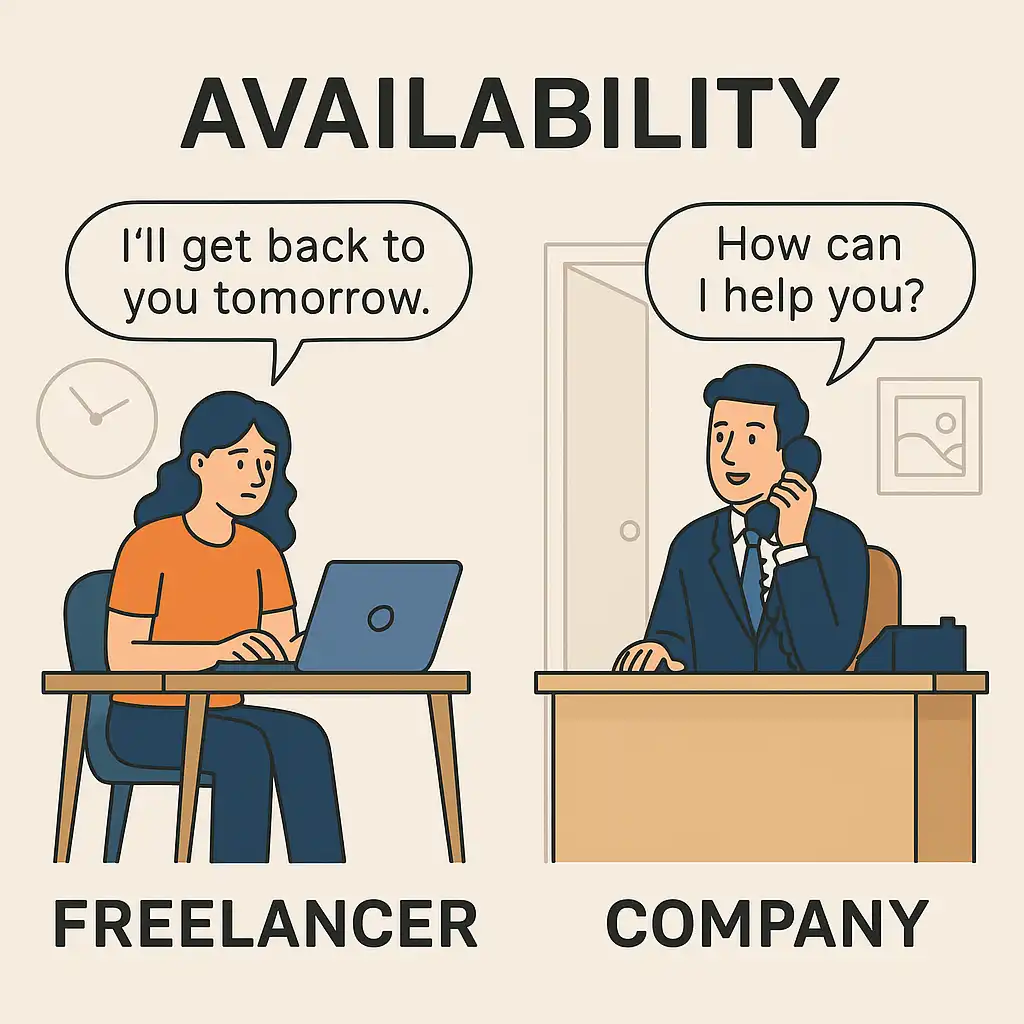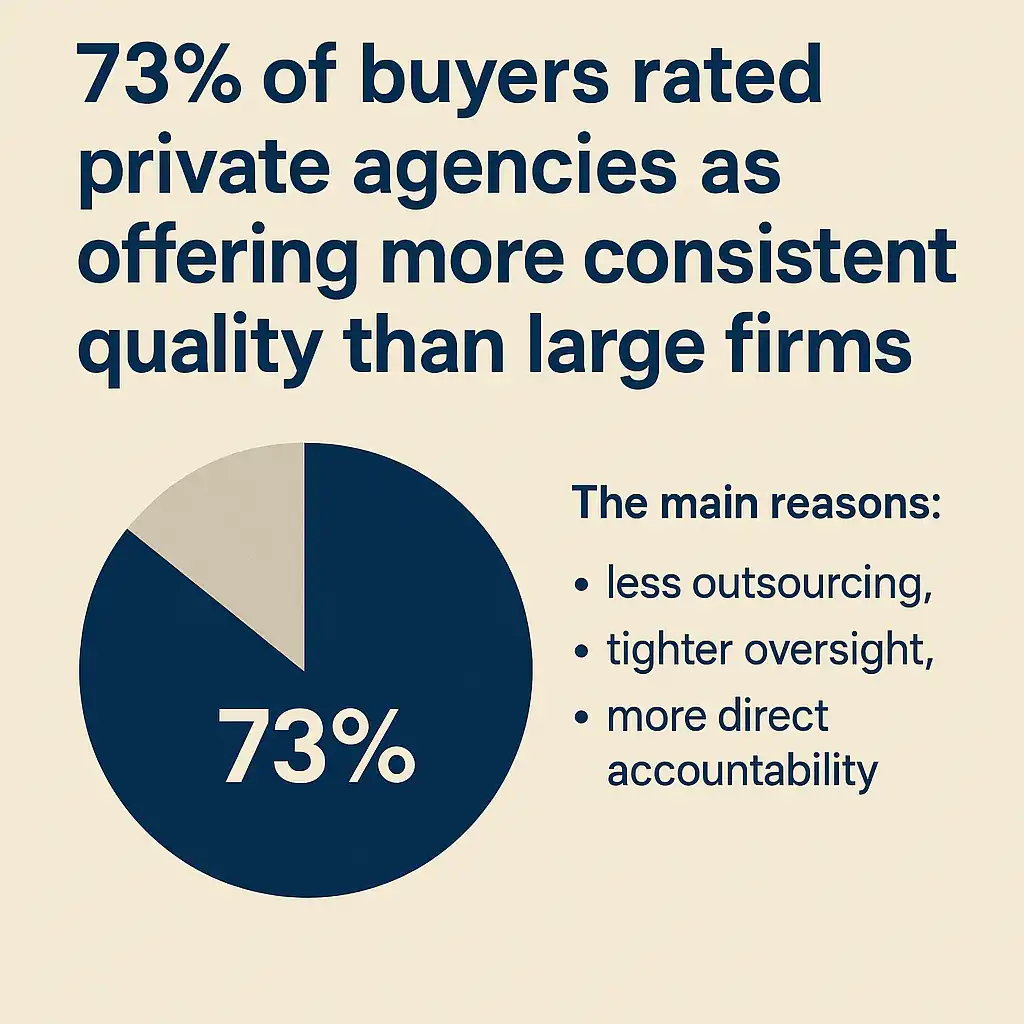With countless translation providers available, should you choose a large company or a private agency? This guide compares quality, speed, tech, and cost—so you can match your project with the right partner.
In this comprehensive guide, we’ll explore:
- How these two providers differ
- The impact on translation quality and consistency
- Speed, technology, and project management
- Cost-effectiveness and long-term value
1. Availability: Who Answers When You Need Them Most?

Freelance translators typically work standard business hours, but many enjoy flexible schedules. This means you might get a reply to your late-night email—or you might wait until the next day. If your freelancer is sick or on vacation, your project stalls.
Translation companies, on the other hand, have teams of project managers and translators in various time zones. With customer portals, shift rotations, and automated tools, they can often offer 24/7 responsiveness and continuity.
“When your entire team relies on updated multilingual content, availability is critical.” —
Localization Team
Verdict:
- Companies win on consistency and backup
- Freelancers may be responsive, but it depends on the individual
2. Technology: What Tools Do They Use?
Let’s talk CAT tools, Translation Memory (TM), and QA modules.
| Feature | Translation Companies | Freelancers / Private Agencies |
|---|---|---|
| Tools Used | Multiple CAT tools and TMS platforms | Often one preferred CAT tool; some avoid them altogether |
| Quality Assurance (QA) | Integrated QA and multi-step review processes | May rely on personal proofreading or client-provided QA |
| Translation Memory (TM) | Centralized TM managed across teams for consistency and cost savings | May use personal TM; not always shared or client-accessible |
| System Integration | Direct integration with client CMS, product systems, or APIs | Rarely offer CMS or system integration unless highly specialized |
| Client Collaboration Tools | Shared licenses for in-country reviewers; collaborative portals | Limited collaboration tools; may request client to provide access |
| File Format Handling | Can work with a wide range of file types (e.g., JSON, XML, DTP formats) via engineering team | Limited format support, usually standard Office or PDF |
“Translation companies often offer integrated systems that reduce manual handoffs and speed up delivery.” — Joanna Tarasiewicz
Verdict:
- Companies lead with scalable tech, automation, and integration
- Freelancers can be tech-savvy, but range widely in their approach
3. Quality: What Does “Professional” Really Mean?
Quality is often where the conversation gets real. Both companies and freelancers can be excellent—or disappointing. It depends on their process.
Companies typically follow ISO-certified workflows. Most use a translator-editor-proofreader structure. Translations are revised by a second linguist and passed through QA before delivery.
Freelancers may or may not revise their own work. Many deliver raw translations unless you request editing as a separate service.
In a 2023 industry survey:

Verdict:
- Freelancers may give you personalized, high-quality work—if you choose carefully
- Companies provide standardized quality control, ideal for regulated industries
4. Turnaround Time: Who Delivers Faster?
Let’s say you need:

A 100-page manual translated into 4 languages
By next week
With identical formatting and terminology consistency
That’s a job for a translation company.
They’ve got scale. They can assign multiple translators, use terminology databases, and rotate work around the clock using time zones.
“A private team just couldn’t have handled our volume and deadlines,”
— Operations Manager, global logistics firm
That said, private agencies can be faster for small- to mid-sized jobs. With fewer handoffs and no layers of approval, they can sometimes start within hours.
“A large company took three days just to quote us. The private agency reviewed our file, gave a timeline, and got started the same day,”
— Thomas C., Immigration lawyer
- Freelancers are great for fast, focused jobs
- Companies shine for big, multilayered projects
5. Pricing: What Are You Really Paying For?
Freelancers typically quote for one step: translation. If you want editing or QA, that’s extra. You’re paying less, but you’re also getting a narrower scope.
Companies include:
- Project management
- Revision and QA
- Translation Memory management
- Resource and terminology consistency
And while rates seem higher, long-term savings accrue via TM reuse and fewer errors.
“Always ask what’s included in the quote. A low rate may leave out key steps like revision.” — ATL
Verdict:

Freelancers offer affordable, a-la-carte pricing
Companies deliver full-scope, often with scalable value
6. Range of Services: Who Can Do It All?
Freelancers usually work in 1–2 languages and focus on translation or revision.
Companies can offer:
- Transcreation
- Voiceover and subtitling
- Desktop Publishing (DTP)
- Localization engineering
- Linguistic testing
Need 8 languages? Voice dubbing? File formatting? A company has the team and tools.
Verdict:
- Companies are one-stop shops
- Freelancers are specialists in specific areas
7. Subject-Matter Expertise
Freelancers typically have deep expertise in 1–2 domains: legal, medical, tech, etc. But they might not be able to handle cross-field content (e.g., legal + marketing).
Translation companies build networks of niche specialists and can assign the right linguist for each document type.
“We had technical manuals, safety sheets, and product descriptions. The agency assigned three experts. It just worked.” — Client Testimonial, Manufacturing Sector
Verdict:
- Freelancers are ideal when you find the perfect match
- Companies handle multi-subject, multi-format content with ease
Final Thoughts: Which One Is Right for You?
There’s no universal answer. The right choice depends on what you value most:
Choose a Translation Company if you:
- Have high-volume or multi-language projects
- Require certification, QA, and project management
- Want a full-service solution
Choose a Private Agency or Freelancer if you:
- Need deep collaboration or creative nuance
- Have focused, specialized content
- Prefer direct, agile communication
Before You Decide, Ask Yourself:
- How many languages do I need?
- How soon is the deadline?
- Do I need editing, QA, or DTP?
- Am I comfortable managing the process myself?
- Do I need consistency across multiple projects?
Need Help Choosing?
Download our free checklist:
Still not sure? Contact us for a quick consult—we’ll help you figure out what fits your business best.
